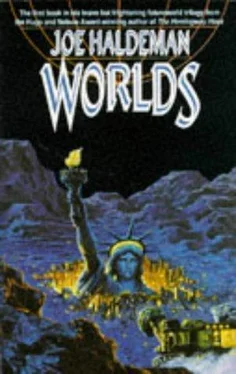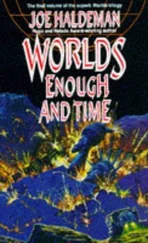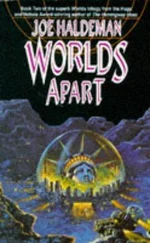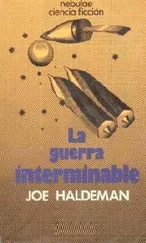The tourism worked both ways, of course. Nearly every man, woman, and kiddo on New New wanted to see Earth. Balance of payments forbade it for all save one in a thousand.
Marianne O’Hara was one of the lucky ones. Depending on how you look at it.
Unlike most of her contemporaries, O’Hara was not obsessed with genealogy, so she didn’t know anything about any ancestors beyond her great-grandmother, who was still alive and in fact also lived in New New York.
She had to learn, though, facing menarche and the prospect of taking a mate. The prevalence of “line families” in the Worlds could generate a lot of relatives. They joked that before you went on a date, you had to check a computer to see what degree of incest you were liable to commit. O’Hara was fourth-generation Worlds, and was related to six different lines, three of them because of her grand-mother, who in her time had been a one-woman population explosion.
Various families’ records went back to a striking red-haired woman who had left a bad marriage and Prussia in the late nineteenth century and came to America. This woman married a blacksmith in Pennsylvania and they had seven children. One son went to wicked Chicago and made his living, eventually, as a courier of money and sometime pickpocket. He was good at both trades, and at being in the wrong place at the wrong time, and was machine-gunned to death, which was not an unusual way to depart, for a young criminal in Chicago. He’d left a son in a prostitute, who left it in an orphanage. The son was encouraged by a gaggle of nuns, and eventually became a stodgy professor of Attic Greek. He had a daughter (the Prussian woman’s red hair coming back) who through a curious sequence of emulation and rebellion wound up with a doctorate in biochemistry, in a specialty that required some work in orbit. In orbit she had a bastard daughter. This daughter stayed in space, joining the New New York Corporation, and eventually became the great-grandmother of Marianne, who would take the name O’Hara.
Her mother was annoyed at Marianne for choosing the name O’Hara. A girl-woman usually chose her name to honor someone; they didn’t even know anyone named O’Hara. She said she’d picked it because she liked the sound (and it did sound better than “Marianne Scanlan,” her root name); actually, she had pored over lists and lists, looking for one best name, until she had lost all power of discrimination.
The night before her menarche party, her body full of private outrage, her head foggy with the drugs that would precipitate fertility, she’d looked at the reading list for her course in twentieth-century popular novelists, and honored John O’Hara because he was near the middle of the alphabet, so she’d never be at the end of a line.
Did her mother have a tin ear, to name her Marianne in the first place? No; at the time of her birth, her mother’s name had been Nabors. They didn’t join the Scanlan line until Marianne was five, her mother all of seventeen.
Most of the people in New New belonged to line families; everyone who wasn’t a groundhog was at least related to a line. The custom had its roots in America, just before the turn of the century, born of taxation and sexual freedom.
Line families first became widespread in New York, where inheritance taxes could gobble up as much as ninety percent of an estate. One way around this was to redefine your family as a corporation, with everybody on the board of directors. A best-selling book explained the simple legal process.
The State retaliated by proving in court that a corporation whose board was entirely blood-related had to demonstrate that it had not been set up purely for the avoidance of taxes. This generated a loud chorus of outraged editorials and pious pronouncements by temporarily out-of-work politicians. Another best-selling book, complete with tear-out forms, explained that the simplest way to get around the new law was to effect a merger: join forces, on paper, with some family that was not related to you.
At this time America was enjoying a return of sexual permissiveness, so a lot of the joining was done on beds as well as on paper. There was also a fashion for communal living, which started in rural areas but was widely embraced in cities—especially New York—when it was shown that a corporation of tenants could make a landlord very cooperative. The term “line family” became common in California, where members of these consensual corporations took the same last name; the custom moved east, and up.
In the Worlds, as on Earth, line families encouraged both nonconformity and rigidity. Over a couple of generations, experiment would become habit would become tradition—and if you don’t like it, why don’t you go start your own line; all right, I will.
For instance, the Scanlan line was made up of three-mate marriages called triunes. Triunes occasionally interlocked to form larger units, but that was considered racy. The Nabors line was less formal. In general, young men paired up with older women and young women with older men, with frequent changes of partners. That Marianne’s mother was only twelve when she gave birth did not raise any eyebrows. But when it turned out that the father not only was not a Nabors, but was a groundhog as well, mother and child were unceremoniously disowned.
To become a Scanlan, a person only had to be of proven fertility, and had either to find a compatible broken triune or to apply with two other fertile people (all three not to be of the same sex). Marianne’s mother took the latter course: she applied with two men, her current lover and Marianne’s father, who returned to his Earthside wife a week later, as had been prearranged.
Thus Marianne was a fatherless prefertile adjunct to a broken triune, with a mother young enough to be her sister (Scanlan women normally postponed children until their thirties). She was different, and the other children were not kind. The boys were unkind and bigger than she was, which might be one reason she delayed womanhood as long as possible.
When she did become a woman she was striking, rather than beautiful, with the genes that had come from Prussia two centuries before: thick dark red hair, eyes the color of copper, skin as pale as wax. People would stare at her.
A menarche party is fun for everybody but the guest of honor. Old wine doesn’t mix well with new hormones. Smug sympathy while your girlhood is being torn bleeding from your body.
O’Hara knew she was drinking too much wine, trying to wash away the acid taste of vomit. That had been because of too many pain pills. The cramps were still there, gentle pressure, waiting for the medicine to wear off. If she sat still she imagined she could feel meat growing, shoving up beneath her boyish nipples. But she couldn’t sit still; no position was comfortable for long. And she couldn’t stand up without feeling nauseated. She had moved the party outside, upstairs into the park, which had helped for a minute. Now there was no place else to go. Except out the airlock. That sounded like an attractive proposition. She wasn’t even bleeding yet, raped by stiff cotton. She would not cry. If one more woman tried to put her arm around her, she’d knock the bitch’s teeth down her throat.
“My poor baby.” Can’t hit your own mother. “You’re so pale. You aren’t going to be sick again?”
“Thanks,” she said through clenched teeth. “I’d almost forgotten.”
“You really shouldn’t drink so much wine, you know. It doesn’t help.”
“Mother. I always throw up at parties. Nerves. I’m all right now. Once always does the trick.”
She smiled uncertainly and cocked her head at her daughter. “I can never tell when you’re being serious.”
Читать дальше












